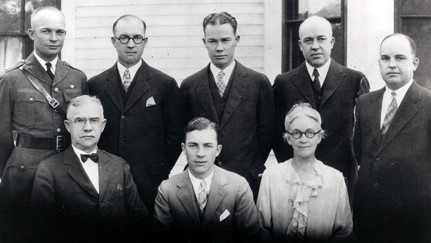Authors:
Historic Era:
Historic Theme:
Subject:
| Volume 71, Issue 4


Authors:
Historic Era:
Historic Theme:
Subject:
| Volume 71, Issue 4
Editor's Note: The following account is from a conversation the editors of American Heritage had with Edgar Eisenhower in 1969. Eisenhower, aka "Big Ike," was a lawyer and businessman and the second-oldest of the Eisenhower brothers.

It was not until [Dwight] was elected to the Presidency that the entire family was pulled into the limelight. The full realization that life never again would be quite the same for us was driven home to me as I stood with the family watching Dwight take the oath of office at the inauguration ceremonies in 1953. The pageantry and solemnity of the occasion would be impressive to any American, but it certainly touched us deeper. There was our brother, Dwight David Eisenhower, taking the same oath that George Washington and Abraham Lincoln had intoned. He was standing there, a figure that would be secure in the history books for all time. Generations of school children would be reading about Dwight Eisenhower two hundred years from now. It was an eerie and solemn feeling.
I doubt if ever I shall be so deeply stirred again. The Presidency had become something near and personal. I was remembering Dwight at that moment only as my kid brother, the tyke I had once shared a bed with, back in Abilene; the scrappy little guy I had battled all through boyhood. . . .
Our lives as youngsters were full and purposeful. There was plenty of fun and good old-fashioned pranks. We played games that kept us happy and exuberant. But behind all of this activity was a stern daily routine of constant discipline and the solid exposure to the principles of life and the values that were planted and developed in our minds.
Mother, I am sure, was proud of her sons. There were times, of course, when we were noisy and a little too enthusiastically original, but still we were healthy and faithful and good natured. Each of us had individual complexities, needing pulling or pushing occasionally, but Mother always seemed to know what to say and what to do to straighten us out. . . .
To help meet household expenses, Mother often sent Dwight and me over to the north side of town with our little red wagon loaded with sweet corn, peas, beans, tomatoes, and eggs. We concentrated on those who never had gardens of their own. Knocking on all those doors distressed me. I didn't like the attitude of the customers, nor the way they fingered our vegetables, taking only the nice ones and paying us only a slim price. Some of them even made nasty remarks about our produce, even though I knew our stuff